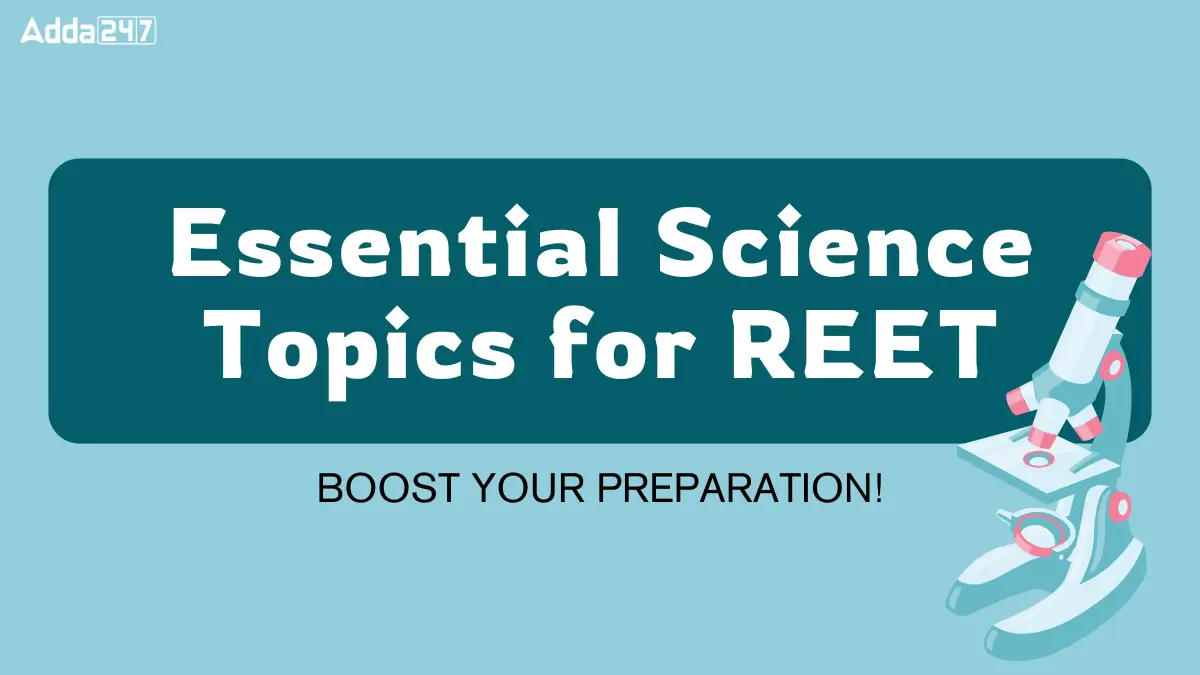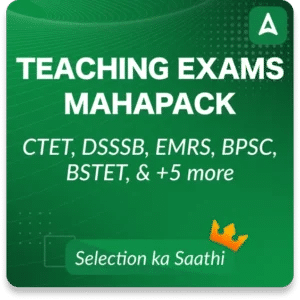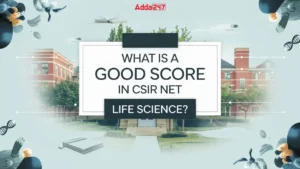Table of Contents
The much-awaited Rajasthan Eligibility Examination for Teachers (REET) is finally set to be conducted in the upcoming week, implying candidates put in their best possible efforts being a competitive exam. Candidates need to align their focus and prioritise the essential topics that are both scoring and cover the most weightage in terms of marks.
For the candidates who chose Maths and Science in the level 2 exam, the Science section holds a significant position as being conceptual accurate can win you the section with ease securing a sure-shot 30 marks. Thereby, we, being the aspirant’s best companion, are facilitating you with important Science topics for the REET level 2 exam to boost your preparation.
Role of Science in REET Level 2 Exam
At this point when exams are just a week away, focusing on essential science topics can improve accuracy and help score full marks in the exam. The Science section being an important part of the exam carries 20% weightage in the exam making it a significant section to focus upon. By following smart strategies like the 80/20 rule, where 20% of topics contribute to 80% of the questions, aspirants can effectively streamline their preparation with these topics. Here are some key points that advocate why Science section can be the game changer with proper focus:
- Dedicated Subject for Paper 2 – Science is a core subject for candidates opting for Maths & Science in REET Paper 2.
- Significant Weightage – The Science section carries 30 marks, making it an essential scoring area.
- Conceptual & Application-Based Questions – The exam assesses both factual knowledge and the ability to apply scientific concepts.
- Scoring Advantage – Strong conceptual clarity in Science can help candidates secure full marks with ease.
Important Science Topics for REET
To perform well in the REET Level 2 Science section, candidates need to focus on topics that are frequently asked and carry high marks. A well-planned approach to these topics will not only improve understanding but also help in better retention and accuracy during the exam. Covering the most relevant topics ensures that candidates can answer confidently and score higher. Below is a list of key Science topics that will help in structured preparation and effective revision before the exam.
| General Physics | |
| Unit | Topics |
| Mechanics | Work, Energy & Power, Gravitation, Motion in a Straight Line, Motion in a Plane, Rotational Motion, Unit & Measurement, Laws of Motion |
| Mechanical Properties of Solids | Stress, Strain & Hooke’s Law, Stress-Strain Curve, Elasticity and Plasticity |
| Mechanical Properties of Fluids | Angle of Contact & Capillarity, Viscosity & Surface Tension |
| Thermal Properties of Matter | Heat Transfer, Specific Heat and Capacity, Thermal Expansion |
| Thermodynamics | Thermodynamic Process, Zeroth Law of Thermodynamics, Laws of Thermodynamics |
| Kinetic Theory | Kinetic Theory of Ideal Gas, Behavior of Gases |
| Oscillation | Simple Harmonic Motion (S.H.M) & Characteristics, Velocity & Acceleration in S.H.M, Periodic & Oscillatory Motion |
| Light | Refraction of Light, Scattering of Light, Reflection from Plane Mirror, Reflection of Light, Spherical Mirror, Lens, Interference & Diffraction of Light, Total Internal Reflection, Dispersion of Light |
| Waves | Transverse & Longitudinal Waves, Electromagnetic Spectrum, Properties of Electromagnetic Waves, Periodic Motion |
| Sound | Sound Properties, Audible & Infrasonic Sound, Loudness & Pitch |
| Electrostatics | Conductance, Conductivity & Resistivity, Electric Charge & Coulomb’s Law, Ohm’s Law & Resistance, Electric Field & Intensity, Electrostatic vs Gravitational Force, Electrical Capacity & E.M.F, Alternating & Direct Current |
| Magnetism | Dia, Para & Ferro Magnetism, Magnetic Field & Magnetic Flux, Magnetic Lines of Force, Properties of Magnets |
| Modern Physics | Anode Rays & Properties, Cyclotron, Nuclear Energy, Radioisotopes & Radioactivity, Nuclear Force, Uses of Nuclear Radiations, Photoelectric Effect & Radioactivity, Semiconductor & Its Types, Cathode Rays & Properties, Nuclear Fusion & Nuclear Fission |
| General Chemistry | |
| Unit | Topics |
| Basic Concepts of Chemistry | Solid State: Amorphous and Crystalline Solids, Intermolecular Forces, Liquid States, Kinetics, Gases and Laws Related to Gases, Laws of Chemical Combination, Stoichiometry and Stoichiometric Calculations, Matter – Properties Measurement, Mole Concept and Molar Masses, Percentage Composition, Empirical and Molecular Masses |
| Equilibrium | Homogeneous Equilibrium, Acids, Bases, Salt |
| Structure of Atom | Concept of Orbitals, Quantum Numbers, Bohr’s Model and its Limitations, Concept of Shells and Subshells |
| Chemical Bond and Molecular Structure | VSEPR Theory, Hydrogen Bonding, Kossel-Lewis Approach, Hybridization |
| Hydrocarbons | Alkenes, Aromatic Hydrocarbons, Alkanes, Carcinogenicity and Toxicity, Alkynes |
| Organic Chemistry | Amines, Haloalkanes and Haloarenes, Biomolecules, Polymer, Alcohols, Phenols, and Ethers, Aldehydes, Ketones, and Carboxylic Acid |
| Solutions | Molar Masses, Types of Solutions |
| Surface Chemistry | Emulsions, Adsorption, Colloids, Catalysis |
| Classification of Elements and Periodicity | Electronic Configuration and Types of Elements, Nomenclature of Elements |
| Chemical Reaction | Oxidation Numbers, Types of Reactions, Oxidation and Reduction Reactions |
| Periodic Table | Important Compounds and Their Uses, p Block, Important Trends and Anomalous Properties, f Block, Hydrogen and Properties of Dihydrogen, s Block, d Block |
| General Biology | |
| Unit | Topics |
| Classification of Animals | Phylum Arthropoda, Phylum Echinodermata, Algae, Phylum Protozoa, Phylum Chordata, Lichen, Phylum Annelida, Virus, Fungi, Difference between Chordates and Non-Chordates, Phylum Nemathelminthes, Protists, Phylum Ctenophora, Phylum Cnidaria, Bacteria, Phylum Mollusca, Phylum Platyhelminthes |
| Cells | Cell Cycle & Cell Division, Types of Cells, Mitosis vs Meiosis, Prokaryotic Cells, Eukaryotic Cells, Structure of Cells, Details of Cell Organelles |
| Nutrition | Proteins, Carbohydrates, Composition of Food, Heterotrophic Nutrition, Fats, Minerals, Photosynthesis, Deficiency Disease |
| Human Digestive System | Digestive Glands & Their Function |
| Bones, Joints, and Muscles | Axial Skeleton, Disorder of Bones, Muscles, Appendicular Skeleton, The Skeletal System, Joints |
| Integumentary System | Soft Derivatives, Skin, Sweat Glands, Hard Derivatives |
| Circulatory System | Heart, Blood Vessels, Plasma, Disease Associated with WBCs, Blood Grouping, Composition of Blood, Platelets or Thrombocytes, Disease Associated with RBCs, Heart Disease, RBC or Erythrocytes |
| Glandular System | Kidneys, Thyroid Glands Disorder, Liver, Endocrine Glands, Anterior Pituitary, Adrenal Glands, Ovary and Testes & Sex Hormones, The Pituitary Glands, Pineal & Thyroid Glands, Pancreas |
| Human Reproductive System | Fertilization, Female Reproductive System, Male Reproductive System, Introduction |
| Human Health and Disease | Disease Spread through Blood Transfusion, Vaccination & Immunization, Types of Disease, Genetic Diseases, Disease Caused by Fungi, Concept of Health by WHO, Bacterial Disease of Humans, Diseases Caused by Worms, Viral Disease of Humans |
| Science Pedagogy | |
| Unit | Topics |
| Nature, Structure & Scope of Scientific Curriculum | Nature of Science, Aim, Objectives and Characteristics of Science, Relationship of Science with Technology and Society, Science Curriculum and Its Designing |
| Understanding and Appreciating Science | Importance of Science in the Field of Education, Understanding of Science Amongst Children, Science Book or Course |
| Approaches in Science | Disciplinary Approach and Integrated Approach, Process Approach, Constructive Approach, Hands-on Approach |
| Teaching Methods of Science | Lecture, Lecture-Demonstration & Lab Method, Heuristic Method and Problem-Solving Method, Observation, Experiment & Discovery |
| Innovation in Science | Teaching & Innovation, Play, Project Method & Seminar Presentation, Team Teaching and its Stages in Science, Lesson Planning |
| Teaching Materials & Aids | Classification of Teaching Aids, Preparation and Selection of Teaching Aids |
| Evaluation | Evaluation Meaning, Concept, and Definition, Types of Evaluation (Viva-Voce and Practical Test, Written Test, Questionnaire and Interview), Bloom’s Taxonomy |
| Remedial Teaching | Meaning and Concept of Remedial Teaching, Remedial Teaching, Individual Tutorial Teaching, Auto-Instructional Teaching and Informal Teaching |
| Problems Related to Science Teaching | Problems in Teaching Science, Recommendations for Science Teaching |
| NCF | NCF 2005 |
| REET 2025 Important Links | |
| REET 2025 Notification | REET Result 2025 |
| REET Eligibility Criteria | REET Syllabus |
| REET Previous Year Question Paper | REET Selection Process |
| REET Validity | REET Cut Off Marks |




 100+ Important GK Questions for HTET Exa...
100+ Important GK Questions for HTET Exa...
 Rajasthan PTET College List 2025, List o...
Rajasthan PTET College List 2025, List o...
 What Is A Good Score In CSIR NET Life Sc...
What Is A Good Score In CSIR NET Life Sc...




